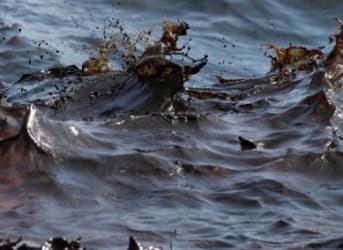People who fish recreationally in the Gulf of Mexico may be entitled to up $585 million in compensation due to lost fishing opportunities following the 2010 Deepwater Horizon oil spill.
A new analysis is the first to estimate recreational fishing losses following such a large disaster.
In the case of the BP spill, the money wouldn’t go back to individual anglers, but instead might fund ecosystem improvements or to stock more fish in the Gulf.
After a disaster such as an oil spill, trustees—who could include federal, state, or tribal authorities—often attempt to secure financial compensation from those responsible.
In December 2012, BP agreed to pay $2.3 billion to commercial anglers, seafood boat captains and crew, seafood vessel owners, and oyster leaseholders, but trustees have yet to seek compensation on behalf of recreational anglers.
“These are sizable losses borne by recreational users of publicly owned resources,” says Sherry Larkin, a food and resource economics professor at the University of Florida.
Because the oil spill affected thousands of square miles of fisheries, trustees could try to compensate for everyone who uses the Gulf in the future.
40 MILLION FISHING TRIPS
The study, published in the Journal of Environmental Management, covers fishing areas off the coasts of Louisiana to Florida and up to North Carolina.
In the case of Florida, anglers who normally would have gone to Pensacola, for example, might instead head to the Atlantic Coast—or not fish at all, Larkin says.
Using an economic formula that uses the cost of accessing a recreational activity, primarily travel costs, to assess the activity’s value, researchers studied three types of anglers: those who fished from shore, those who piloted private or rental boats offshore, and those who paid for guide boats to take them fishing. Each of the three types of trips was assigned an economic value.
Anglers fishing from shore and those that hire fishing guides lost the most—an average of $29.65 and $34.27 per trip, perhaps because they are less able to change their fishing conditions. Those who pilot their own boats lost the least at $2.23 per trip. Private and rental boat users were affected differently, some substantially but others not much.
The analysis is based on data collected from interviews with saltwater anglers by NOAA’s Marine Recreational Information Program, which regularly surveys anglers on their catch. Each year approximately 40 million trips are taken in the US Southeast.
The researchers used about 70,000 fishing trips each year for five years (2006 to 2010) to learn how each type of anglers changed their fishing trips to avoid closures in federal fisheries following the oil spill. They arrived at the $585 million figure by multiplying the per-trip losses for each type of trip by the number of affected fishing trips, which was assumed to be for the year as if anglers could re-plan their trips to avoid closures, Larkin says.
The study is the first to estimate recreational fishing losses following such a large oil spill.
At 206 million gallons, the Deepwater Horizon was the largest marine oil spill in history. Under the Oil Pollution Act of 1990, trustees can recover public losses from responsible parties. The model only depicts losses for recreational fishermen, not commercial fishermen, hotels, restaurants, or retail establishments that lost money after the BP oil spill. It also doesn’t measure ecosystem losses.
By Brad Buck-Florida
BP responded to the study by providing the following statement.
Statement by BP on University of Florida Study
“The researchers that conducted the study made a significant mistake in their calculations, and were informed of the error weeks ago, but the University of Florida still chose to publicize the erroneous findings. The correct formula for calculating this type of recreational use injury has been used by environmental economists for decades, and is published in numerous journals and textbooks, including a textbook* written by one of the co-authors of this paper. Instead of using this approach, the authors used an incorrect formula that violates accepted economic procedure and adds more than $500 million to their damage estimate.
Regardless, the ongoing Natural Resource Damage Assessment (NRDA) is the process that will evaluate potential loss of recreational use of natural resources caused by the spill. Until that process is complete, it is premature to speculate about the value of any alleged lost use."
* Haab, Timothy, and McConnell, Kenneth E. 2002. Valuing Environmental and Natural Resources: the Econometrics of Non-market Valuation, Edward Elgar Publishers, Northampton, MA at p. 224.
(Article source: University of Florida)


















